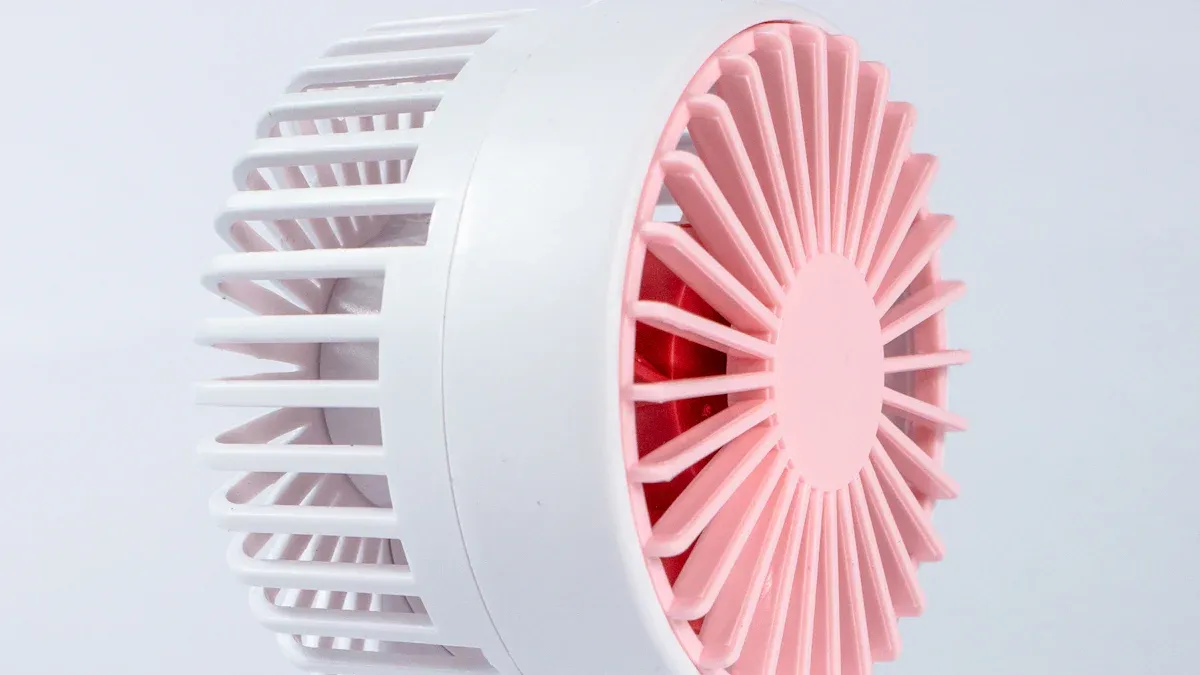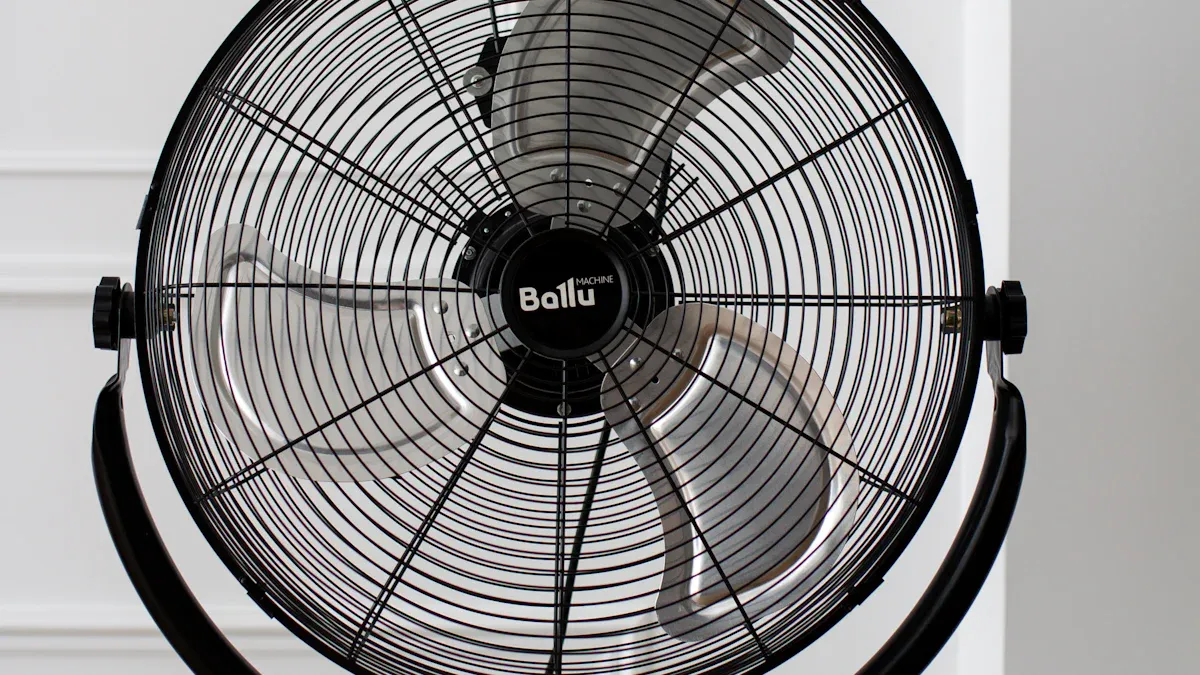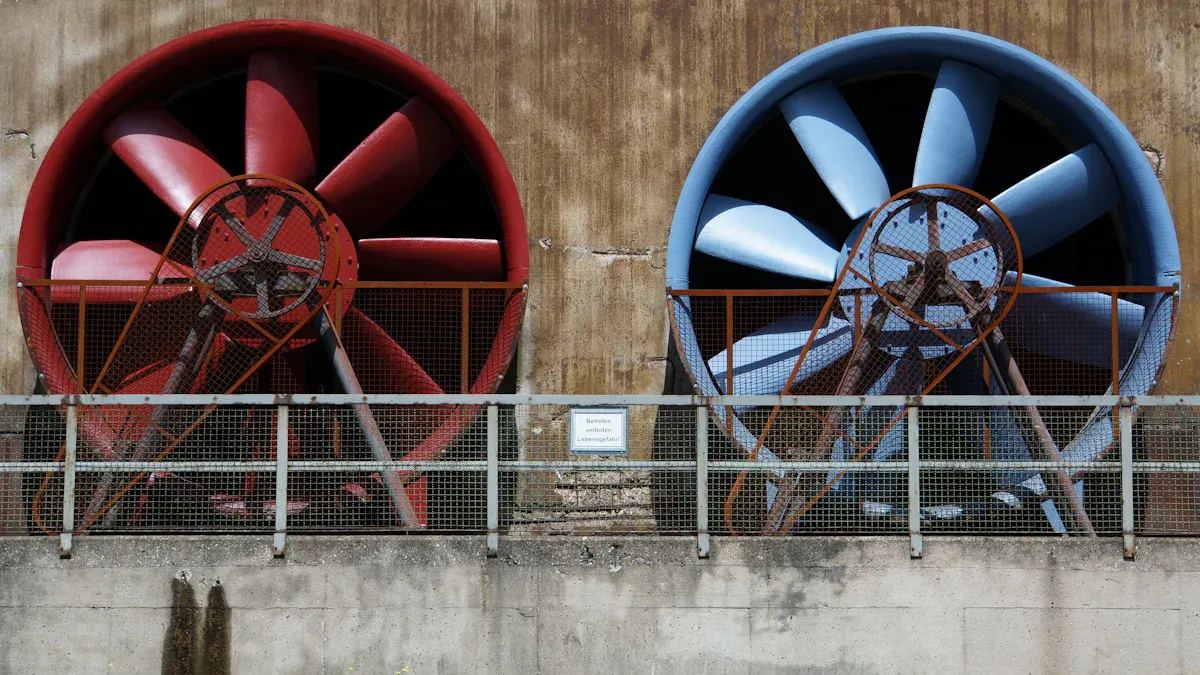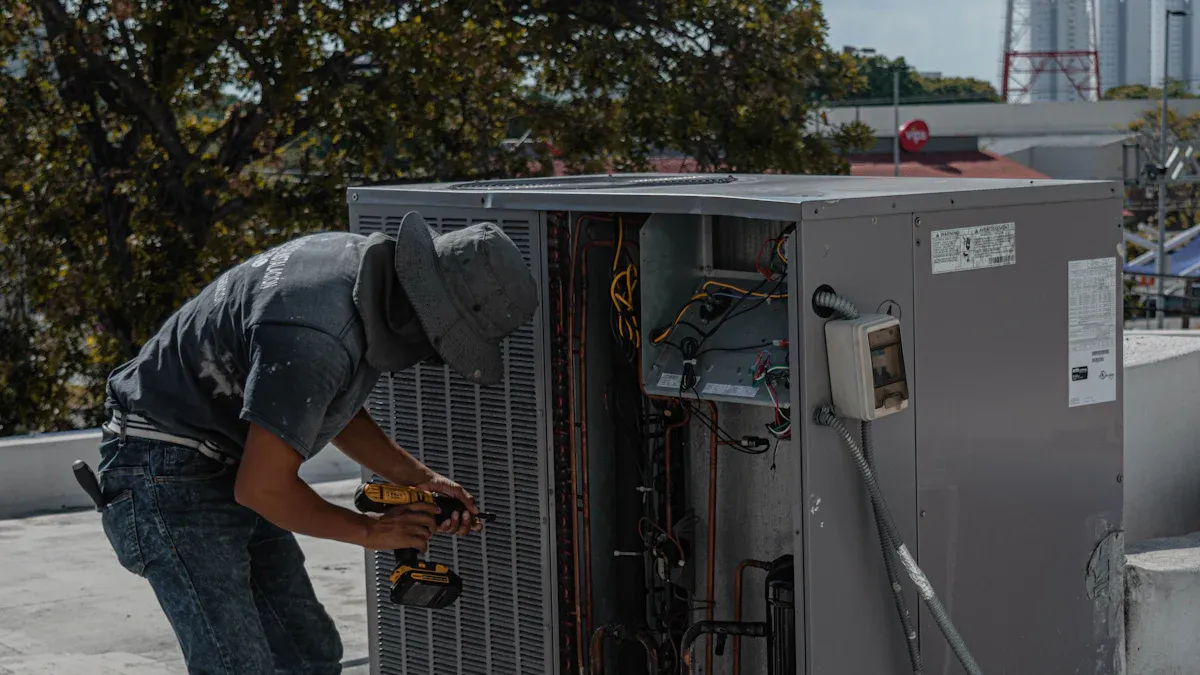The Role of Plastic Cross Flow Fans Impeller in Advancing HVAC Technology

You can achieve better airflow and cooling with the LONGWELL Air Conditioner Plastic Cross Flow Fans Impeller. This impeller is specifically designed for use in air conditioners within HVAC systems. The technology utilizes strong plastics like ABS and PP ABS+GF, which contribute to reduced noise levels and enhanced durability. Many users report that these air Conditioner Plastic Cross Flow Fans Impellers are lightweight and resistant to rust. They are compatible with home air conditioners from major brands and are easy to install while providing excellent performance.
Here is a quick look at user-reported benefits:
Advantages |
|---|
Lightweight and corrosion-resistant |
Cost-effective for manufacturing |
Suitable for low-speed applications |
Key Takeaways
Plastic cross flow fan impellers help air move better. They make cooling work well in HVAC systems. This is good for home air conditioners.
Materials like ABS and PP ABS+GF are strong. They do not rust. They are light. This helps the impeller work better.
The impeller is small and easy to put in. It is simple to take care of. It fits many air conditioner brands. You do not need extra parts.
New blade shapes in impellers save energy. They make less noise. They spread air better.
Picking the best impeller can lower energy bills. It helps keep your home comfy. Air flows steady and smooth.
Plastic Cross Flow Fan Impeller

Definition and Features
A plastic cross flow fan impeller is important in many HVAC systems. It is used a lot in home air conditioners. The impeller has a long, round shape with blades on it. When the fan runs, it pulls air into the middle. Then, it pushes air out along its whole length. This makes air move evenly and cools rooms better than old fans.
The impeller design saves space and fits in small air conditioners. You do not need extra parts to guide air. This makes it easier to install and take care of. The LONGWELL plastic cross flow fan impeller works with many top brands. It supports different motors and voltages.
Here is a quick overview of the main characteristics and operational principles:
Characteristic/Principle | Description |
|---|---|
Compact Design | Fits easily into small spaces in home air conditioners and other HVAC units. |
Uniform Airflow Distribution | Delivers steady airflow across a wide area for even cooling. |
Robust Construction | Uses strong plastics for long service life and reliability. |
Airflow Mechanism | Draws air along the impeller’s length, creating a vortex for efficient air movement. |
Low-Speed Operation | Works well at lower speeds, making it quieter and more energy-efficient. |
Material and Design Benefits
The impeller uses special plastics like ABS and PP ABS+GF. These materials make it light, strong, and do not rust. The LONGWELL impeller lasts a long time and works well every day in home air conditioners.
The impeller with ABS+GF is much stronger than regular ABS.
It bends less and breaks less easily because it is tougher.
PP-based materials help the impeller last longer when used a lot.
The impeller also has a dual bearing system. This makes it quieter and helps it last longer. You can install the LONGWELL impeller easily. It works with many voltages like 110V, 230V, 12V, 24V, and 48V. This makes it good for new air conditioners or for replacing old ones.
Tip: Picking an impeller with these materials and features gives you better airflow, less noise, and more comfort at home.
Air Conditioner Plastic Cross Flow Fans Impeller in HVAC
Efficiency and Performance
You want your HVAC to give you steady air. The plastic cross flow fans impeller helps with this. It uses strong plastics like ABS and PP ABS+GF. These materials make the impeller light and tough. They also stop rust and wear. This means the impeller works well for a long time.
When you use a LONGWELL impeller, you see a change. Your HVAC system works better. The impeller makes air move wide and even. Every part of your room feels cool and fresh. The impeller pulls air in along its length. Then it pushes air out smoothly. You get a steady flow rate. This helps your air conditioner work well.
Cross flow fans use less power than other fans.
You save energy because the impeller works best with steady airflow.
The impeller works with AC, DC, and EC motors.
You can pick different speeds like 4000rpm, 1100rpm, or 990rpm.
The LONGWELL impeller fits many top HVAC brands. You can use it in air conditioners, ventilation, and air purifiers. The mounting design makes it easy to install. You spend less time setting up. You get better air quality faster.
Note: A steady flow rate and good energy use help your HVAC last longer. You also pay less for electricity.
Noise Reduction and Reliability
You want your home or office to be quiet. The plastic cross flow fans impeller helps lower noise. It uses a dual ball bearing system. This lets it spin smooth and quiet. You hear less noise, even after hours of use.
The plastic in the impeller absorbs vibrations. Your HVAC does not rattle or shake. You get a calm space for work, rest, or sleep.
The impeller does not rust, so it works well in humid places.
The free-standing mount keeps the impeller stable and easy to care for.
You can pick from voltages like 110V, 230V, 12V, 24V, and 48V.
A strong impeller means fewer problems and less fixing. You get better air and comfort every day. The LONGWELL impeller gives you trust in your HVAC system.
Feature | Benefit for You |
|---|---|
Dual Ball Bearings | Quieter operation |
ABS/PP ABS+GF Material | Long-lasting and rust-resistant |
Wide Compatibility | Fits many HVAC and ventilation systems |
Multiple Voltages | Flexible installation |
You can count on the plastic cross flow fans impeller. It keeps your HVAC running well. You breathe cleaner air and feel more comfortable.
Types of Impellers in HVAC

Cross Flow vs. Pump Impeller
There are different impellers in hvac systems. Each one moves air or fluids in its own way. The cross flow impeller pulls air in from the side. It sends out a wide sheet of air. This helps cool your room smoothly. It makes your air conditioner work quietly. The LONGWELL plastic cross flow fan impeller uses this idea. It gives you comfort and less noise.
The pump impeller works another way. It pushes fluid out from the middle. This makes the flow go outward. It can make higher pressure. Some hvac systems need strong airflow or water movement. You might see pump impellers in those places.
Here is a table that shows the main impeller types and how they work in hvac:
Impeller Type | Operational Principle | Applications |
|---|---|---|
Cross Flow | Air enters perpendicular to axis, exits as a broad sheet | Home air conditioners, air curtains |
Pump Impeller | Fluid moves radially outward from center | Water pumps, hvac cooling systems |
Axial Impellers | Air moves parallel to shaft | Large ventilation fans |
Centrifugal Impellers | Air enters axially, exits radially, creating pressure | Ducted hvac units, blowers |
Mixed-Flow Impellers | Combines axial and centrifugal movement for high flow and pressure | Specialized hvac systems |
Radial-Flow Impellers | Pushes fluid outward at a right angle, generating pressure | Industrial hvac, chemical processing |
Tip: Cross flow impellers give smooth airflow and quiet use. Pump impellers help when you need more pressure.
Material Comparison: Plastic vs. Metal
You might wonder which impeller material is best for hvac. Plastic impellers, like LONGWELL’s, have many good points. They are light, so motors do not work as hard. You save energy and can install them easily. Plastic does not rust, so it lasts longer in wet places.
Metal impellers are often made from stainless steel. They are heavier and cost more money. Metal impellers are very strong and do not rust easily. Many big hvac systems use metal impellers for tough jobs. But plastic and composite impellers are getting more popular. They are easier to use and take care of.
Here is a table that compares plastic and metal impellers:
Attribute | Plastic Impellers | Metal Impellers (Stainless Steel) |
|---|---|---|
Cost | Cost-effective, ideal for price-sensitive applications | Higher cost compared to plastic impellers |
Weight | Lightweight, reduces motor stress | Heavier, may increase energy demands |
Corrosion Resistance | Excellent corrosion resistance | Superior corrosion resistance and durability |
Metal impellers are still used most in hvac because they are strong.
Plastic impellers are becoming more common since they are light and do not rust.
You can pick the best impeller for your hvac by thinking about what you need. If you want quiet and good cooling at home, a plastic cross flow impeller like LONGWELL is a smart pick. If you need high pressure or heavy-duty work, metal pump impellers might be better for your system.
Applications of Impellers

Residential and Commercial Use
Plastic cross flow fan impellers are used in home air conditioners. These impellers help cool rooms evenly. You feel more comfortable and breathe better air. The impellers are light, so you can install them easily. You do not need special tools or extra parts. You can change old impellers fast and get your air conditioner working again.
Offices, stores, and schools use these impellers too. They are found in HVAC units, air purifiers, and air curtains. You get quiet air and steady airflow. The impellers fit many top brands, so you do not worry about matching. You can pick voltages like 110V, 230V, 12V, 24V, or 48V. This helps you find the right impeller for your system.
Tip: For a simple upgrade, choose impellers with free-standing mounts and ball bearings. You will hear less noise and your impeller will last longer.
Specialized Environments
Plastic cross flow fan impellers are used in labs, hospitals, and fridges. These places need steady air and quiet fans. The impellers give wide, even airflow. This keeps the temperature steady and protects important equipment.
You can pick impellers with different voltages and strong materials. You get help with repairs and free spare parts. The impellers work in temperatures from -20°C to 60°C. You can trust them in tough places.
Here is a table with features for special HVAC uses:
Feature | Details |
|---|---|
230V, can be changed for your needs | |
Material | Light but strong aluminum alloy |
Operating Temperature Range | -20°C to 60°C |
After-Sales Service | Free spare parts included |
Noise Level | Low |
Warranty | 1 Year |
You get these good things:
Wide, even airflow for steady air in rooms
Good heat control for better dependability
Saves energy with different speed choices
Plastic cross flow fan impellers work in many HVAC systems. You get video help and a one-year warranty. You feel sure when you pick these impellers for your air conditioners and fridges.
Advancements in Impeller Technology

Innovations and Future Trends
New ideas are changing hvac systems. Engineers make impellers with blades that sweep forward at angles like 10°, 15°, and 20°. These blade shapes help air conditioners work better. A 20° sweep can make the system about 1.5% more efficient. It also adds 15 Pa more pressure when airflow is low. If the sweep starts at 60% of the blade span, the impeller works even better. You get up to 2% higher efficiency and 40 Pa more pressure.
Modern impellers use equal-variable circulation blades. These blades make air move faster at the tips and roots. This helps the fan push air smoothly. Computer tests show forward-swept blades stop airflow from separating. This gives you steady and quiet air in your hvac system.
LONGWELL plastic cross flow fan impellers use these new designs. You get better airflow, less noise, and parts that last longer. The impeller fits home air conditioners. It works with AC, DC, and EC motors. You can pick speeds like 4000rpm, 1100rpm, or 990rpm. The product works with voltages like 110V, 230V, 12V, 24V, and 48V.
Tip: Picking an impeller with advanced blade design helps your hvac system save energy and stay quiet.
Impact on HVAC Industry
New impeller technology brings big changes to the hvac industry. Better impeller designs lower turbulence and cavitation. Your air conditioner cools rooms faster and uses less energy. Smart controls let you change fan speed for comfort and lower costs.
Here is a table comparing old and new hvac designs:
Aspect | Traditional Designs | Energy-Efficient Designs |
|---|---|---|
Control Systems | Basic on/off controls | Smart, variable speed controls |
Impeller Design | Standard impellers | Optimized impellers |
Thermal Management | Poor cooling | Efficient cooling |
You get more good things with advanced impellers:
Lower running costs
Less pollution
Better reliability
Smaller pumps and less space needed
LONGWELL plastic cross flow fan impellers help you meet new standards. You get a reliable hvac system at home. The impeller lasts longer and needs less fixing. You enjoy cleaner air and a quieter place.
Note: Advanced impeller technology helps the planet and saves you money over time.
You can see how the plastic cross flow fans impeller helps HVAC get better. These impellers are light and save money. They also make less noise in homes and businesses. Many companies use strong materials like ABS and PP ABS+GF. This helps the impeller work better.
Material | Applications | Suitable Brands |
|---|---|---|
ABS | Air conditioners, ventilation units | LG, GREE, MIDEA, etc. |
PP ABS+GF | Air curtains |
You save energy and your rooms stay quieter.
Makers can build smaller and better systems.
Using earth-friendly materials will bring more new ideas.
FAQ

What is a plastic cross flow fan impeller used for?
You use a plastic cross flow fan impeller in home air conditioners. It helps move air smoothly across the room. You get even cooling and better comfort.
Why should you choose the LONGWELL plastic cross flow fan impeller?
You get strong ABS or PP ABS+GF material. You install it easily. It fits many brands like LG, GREE, and MIDEA. You enjoy quiet operation and long-lasting performance.
What are the main specifications of the LONGWELL impeller?
Specification | Details |
|---|---|
Material | ABS, PP ABS+GF |
Motor Types | AC, DC, EC |
Speeds | 4000rpm, 1100rpm, 990rpm |
Voltages | 110V, 230V, 12V, 24V, 48V |
Mounting | Free-standing |
How do you install a plastic cross flow fan impeller?
You follow the video guide. You use basic tools. You mount the impeller with ball bearings. You connect the wires to the correct voltage. You finish in a short time.
Where can you use plastic cross flow fan impellers besides air conditioners?
You use them in air purifiers, air curtains, and ventilation systems. You get steady airflow and low noise in offices, schools, and hospitals.
See Also
Understanding Cross Flow Fan Efficiency In Contemporary Ventilation Systems
Selecting The Ideal Cross Flow Fan For Your Needs
Cross Flow Fans And Blowers Overcoming Cooling Issues In Confined Areas